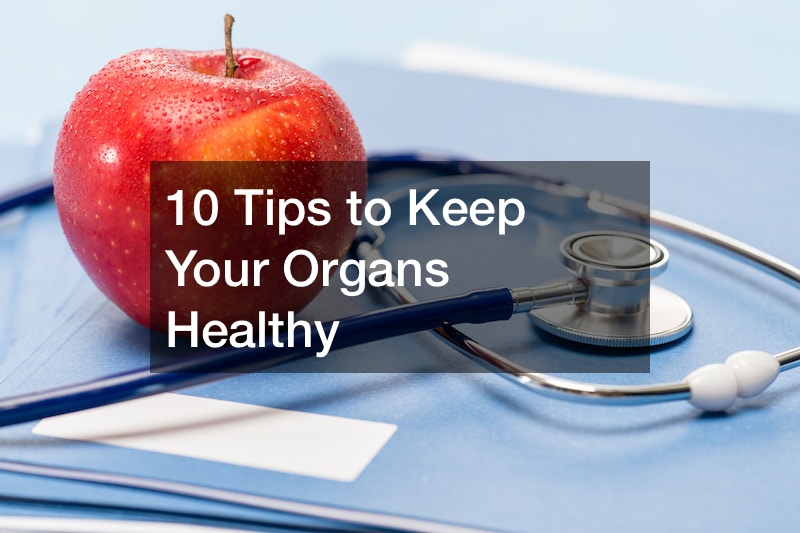
The desire to live longer has been chronicled in Greek myths, modern novels, contemporary books, and films. However, science, medicine, and health improvements have allowed people to live longer. However, it’s a great habit that extends your life, not some miraculous medication. Genetic factors may have a less significant impact on a person’s lifetime than current lifestyle factors. Age-related autoimmune illnesses like diabetes, cancer, and heart disease were less likely to strike those who lived the longest, well into their late nineties and beyond. You might age more gracefully and live longer if you lead a healthy lifestyle. Read on to find out the ten tips to keep your organs healthy. Although your body has 78 organs, only five are necessary for basic survival: your brain, heart, liver, kidneys, and lungs. Maintaining the optimal condition of these organs enables you to live a full and active life. Here are ten tips to keep your organs healthy.
1. Keep Your Air Clean

Indoor air pollution is an issue that affects a large number of people. The average person spends 90% of their time inside, meaning they spend much time breathing in polluted air. Health problems associated with air pollution include:
Pneumonia
Pneumonia in children is two times more likely to occur when exposed to poor air quality. According to WHO, 45% of pneumonia fatality cases in children under five are attributed to air pollution. Additionally, air pollution raises the risk of lower respiratory infections in adults, which accounts for 28% of mortality.
Chronic Obstructive Pulmonary Disease(COPD)
COPD disease is one of the leading causes of death in the modern world. You may develop COPD if exposed to a lot of indoor smoke; this condition affects both men and women equally frequently.
Lung Cancer
According to NCBI, exposure to carcinogens in the air, particularly those produced by coal, charcoal, or kerosene-based cooking, is responsible for around 17% of lung cancer cases.
Ischaemic Heart Disease
Additionally, connected to ischemic heart disease, which is responsible for nearly 1 million cases of premature death and 11% of all deaths, is indoor air pollution, according to BMC Public Health.
It can be dangerous to spend too much time indoors. So keeping your air clean is one of the most important things to do among the 10 tips to keep your organs healthy. First, there are particles from dust and other materials such as wood, fabric, and paper.
These tiny particles can adhere to dust mites or bacteria on surfaces such as upholstery or carpets. The microorganisms release tiny droplets of liquid waste, which will settle on furniture or rugs. These droplets can transmit the infection to humans who come into contact with them.
Opening a window is the most straightforward and least expensive approach to increase ventilation. Still, it is only sometimes a choice, especially if the air outside is more contaminated. But you can use an AC to dehumidify and have good indoor air quality. If your AC is faulty, it’s time to consider contracting Trane ac maintenance services to fix it.
2. Limit Mold Exposure
There are many potential health impacts from exposure to moldy and wet conditions. Some people are allergic to mold. These people may experience symptoms from mold exposure such as runny nose, wheezing, red or itchy eyes, or skin. Some people may experience more severe reactions, such as asthma or mold allergies. Workers exposed to a lot of mold at work, like farmers who handle moldy hay, may experience severe reactions. Fever and breathing difficulties are examples of severe reactions.
In 2004, the Institute of Medicine (IOM) determined enough data to connect indoor mold exposure and upper respiratory symptoms like coughing and wheezing in otherwise healthy people. Symptoms of asthma in people who already have the disease and hypersensitivity pneumonitis in people prone to this immune-mediated condition.
The WHO Guidelines for Indoor Air Quality, supplementary recommendations, were released by the World Health Organization in 2009. Other recent studies have suggested a possible connection between early mold exposure and the onset of asthma in some children, particularly in those who may be genetically predisposed to the disease. They have also suggested that certain housing-related interventions can help lower the morbidity associated with asthma and respiratory allergies.
So, how do you get rid of mold? Growing mold in residences and structures signifies the presence of moisture. This is another main issue among the 10 tips to keep your organs healthy that needs to be solved first. Clear the living spaces of moldy from the carpet, ceiling tiles, drywall, or wallboard. Bring in tree removal companies or a firewood processor to get rid of mold in trees in your compound.
It is also crucial to thoroughly clean and dry the area because mold contamination may return if there is still a moisture source, and you may still be allergic to some pieces of dead mold. If carpets or upholstery do not dry quickly after being wet, remove or replace them. If you have a lot of molds on the roof and think you need help cleaning up, you might want help from a residential roofing company.
3. Keep Your Ground Clean

Keeping your ground clean is another important thing among the 10 tips to keep your organs healthy. Keep your home clean to prevent health problems by mowing your lawn frequently, cleaning up pet droppings, and covering any standing water that is not natural, like from a pool or pond.
A neglected septic system can contaminate your dwelling. People, animals, pets, and wildlife in the vicinity all face significant health risks as a result of this. Having a routine cesspool pumping service performed at least once every two years may prevent this from happening to you and your property.
Also, improper waste management also risks your health. A healthy and happy existence requires keeping your house, workplace, garden, and environment clean. The procedure is tedious and exhausting. But here is when waste removal services come into play. The expert service provides a general hygienic vibe and keeps the surroundings clean.
4. Remove Pests
When did you first consider pest control? Is it when you spot an ant colony on your kitchen floor or a spider in the bathtub? Is it the discovery of a mouse in your neighbor’s garage or the appearance of a hornet’s nest on your patio? You will likely be actively considering a pest once you see one.
But is the ‘out of sight, out of mind’ strategy the best for controlling pests? We should remember that the issues rodents and bugs cause, not just their appearance, are why we have grown wary of them. Whether or not you notice them, pests can pose several health dangers inside your house. Among these dangers include allergic reactions, the effects of poisonous bites, or even illnesses brought on by puncture wounds or contact with trash and excrement.
Here are some strategies among the 10 tips to keep your organs healthy by preventing pest infestations in your home:
- Ensure that you seal any potential entries. Pests can enter your home through cracks in the foundation, door and window frames, or walls.
- Regularly clean your house. Pests can find food and shelter amid clutter, dust, wetness, and food crumbs.
- For small-scale pest control, use bait and traps. You can use them to stop initial infestations.
- Use good food sealing. Unsealed food releases odors that attract pests, contaminating the food.
- Keep the area around the building dry as much as possible. Eliminate places where water can pool and make drainage systems discharge away from the foundation.
Use effective pest management to protect yourself from the diseases and allergies that pests bring into your home. Every technique, from basic cleaning to contracting pest companies and wildlife control, makes it easier to get rid of pests.
5. Limit Sun Exposure

solar exposure has advantages and disadvantages. UV rays are beneficial to us in tiny doses. By producing vitamin D, it aids in calcium absorption. You require calcium in your body to create and maintain strong bones. Additionally, several food items contain vitamin D. Your doctor might advise taking a vitamin D supplement if you have low levels.
The World Health Organization (WHO) states that UV rays can assist in treating several medical diseases. Doctors may prescribe it for patients with eczema, psoriasis, rickets, or jaundice. They also use UV rays to sterilize or disinfect.
However, sun exposure in excess can be dangerous. It may result in the following:
- Freckles and moles
- Early aging
- Eye injuries
- Skin cancer
The negative effects of sun exposure are avoidable. Learn how your body responds to sunlight and observe these tried-and-true US Food and Drug Administration (FDA) recommendations. These are also important things to do among the 10 tips to keep your organs healthy.
- Put sunscreen on. The more SPF there is, the more UV rays it will block.
- Prepare for exposure. Between 10 am and 4 pm, stay out of the sun. The sun’s beams are most intense at this time.
- Take breaks. Sun exposure should be limited.
- Cover up. Put on clothing and a hat to shield your skin from UV rays. In addition, install quality blinds in your home and office. A blind installation service can help you get the job done.
6. Eat Healthy Foods
Natural sugar sources, like fresh fruit, do not overburden your organs and are more straightforward for your body to absorb than manufactured sugars. Consuming enough fiber, which may be found in fruits, vegetables, and whole-grain foods, is also crucial.
According to Eating Well, avoiding processed carbs, particularly refined carbohydrates included in foods like bread, pasta, and basmati rice, fizzy drinks, baked goods, and meals heavy in fat, will help keep your body healthy and operating optimally. Consuming too much salt can also raise blood pressure, which increases the risk of renal and heart problems.
7. Start a Regular Physical Activity Routine

According to ScienceDaily, engaging in regular physical activity can help you achieve and maintain a healthy weight, lower blood pressure and cholesterol levels, build muscle, improve sleep quality, and increase muscle strength. This is one of the most important things to do among the 10 tips to keep your organs healthy. You only need to engage in regular activities that cause your heart rate to increase; you don’t need to follow a specific exercise schedule.
8. Be Kind To Your Kidneys
For healthy kidneys, drinking enough fluids is crucial, especially when exercising. Dehydration and electrolyte depletion can cause cramps, headaches, dizziness, and kidney stones.
The urinary tract system may be affected when you become dehydrated or have excess sugar or pollutants in your body. These conditions put more strain on your kidneys. Additionally, it can prevent your kidneys from producing vital hormones for the endocrine system and blood pressure control.
According to the National Kidney Foundation, saunas, hot yoga, and strenuous exercise can cause kidney stones. Why? As a result of increased perspiration and decreased urine production, minerals can collect and bind together to create kidney and urinary tract stones.
What causes your kidneys to smile? Water. Your kidneys also hanker after fresh parsley, cranberry juice, ginger, and dandelion tea. You aren’t drinking enough water if your pee isn’t clear or light yellow.
9. Get Enough Sleep
Chronic sleep deprivation is linked to a higher risk of obesity, diabetes, depression, heart disease, and hypertension. Fortunately, exercise is good for preserving and even enhancing brain health. It raises the heart rate, increasing the amount of oxygen, nutrients, and hormones delivered to the brain; it elevates your mood and lowers stress and anxiety.
For better mental performance, consume berries, drink caffeinated coffee and tea, and eat walnuts for memory preservation. Beta carotene, folate, lutein, and other nutrients found in green, leafy vegetables and some fish may help reduce cognitive loss. Omega-3 fatty acids may also help lower blood levels of certain compounds linked to Alzheimer’s disease.
10. Eat a Balanced Diet
Last on our list of the 10 tips to keep your organs healthy is ensuring you eat a healthy diet to keep your organs functioning properly. A balanced diet includes plenty of fruits, vegetables, whole grains, and lean proteins. You should also limit the amount of alcohol you drink, eat sweets in moderation, and avoid processed foods. Avoid high-calorie snacks that are high in sugar and fat.
It takes a lot of work to keep your organs in good shape, but it’s not impossible. With a little bit of effort on your part, you can stay healthy and feel great! The hardest part is recognizing the signs that something is wrong. But by keeping up with these 10 tips to keep your organs healthy, you’ll know exactly what you need.



